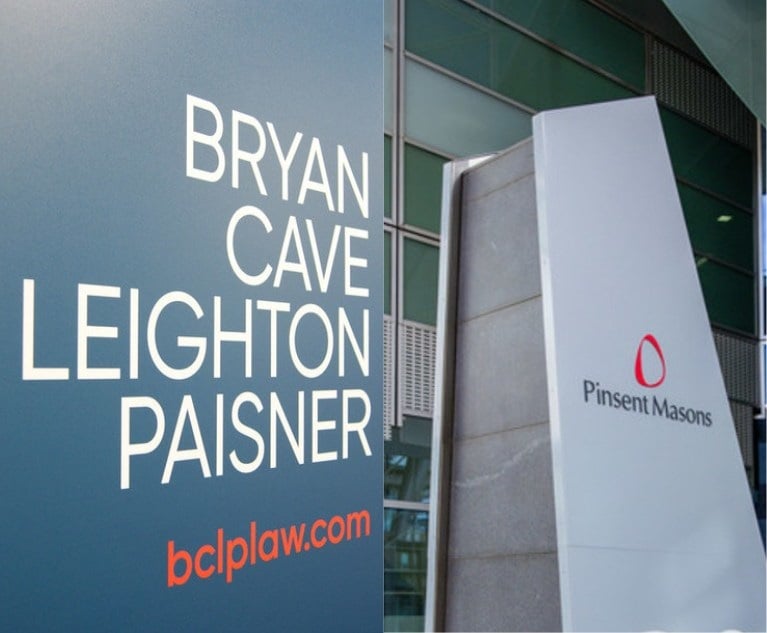Dechert's London office to launch Brexit client hotline
Dechert EU trade co-head Miriam Gonzalez gives her view from inside a US firm on how firms should prepare for Brexit
June 21, 2016 at 04:36 PM
5 minute read
 Dechert's London branch is setting up a hotline for clients to tackle any queries they may have as the UK public prepares to vote this Thursday on whether to stay in the European Union (EU).
Dechert's London branch is setting up a hotline for clients to tackle any queries they may have as the UK public prepares to vote this Thursday on whether to stay in the European Union (EU).
The firm has a team of between 12 and 15 partners, including Gonzalez, who are responsible for providing answers to any client questions related to the EU referendum.
"The first two weeks after a Brexit outcome would be a very scary time for companies," EU trade co-head Miriam Gonzalez said.
Dechert is in the process of creating a dedicated telephone number for clients to call, which will be diverted to Gonzalez's mobile. She will then work out who is best placed in the team to take the call.
Other team members include London employment head Robert Wynn-Evans, Paris IP head Marianne Schaffner, Brussels corporate partner Eric Deltour and New York competition co-head Michael Weiner.
The team will provide free legal advice through the hotline although any follow-up consultation would involve normal billable hours.
The hotline is set to go live within the next 24 hours.
Gonzalez is well placed to comment on such issues, having worked as a Spanish-qualified lawyer in London at Dechert and as co-head of the firm's EU trade and EU government affairs practice for four and a half years.
She will join Dechert's management committee for the London office from 1 July.
Before that, Gonzalez spent five years at UK firm DLA Piper, where she became head of trade and government relations, after stints as a senior adviser in the cabinets of EU external relations commissioners Chris Patten and Benita Ferrero-Waldner.
The issues are endless as it would touch on every single practice area
The types of issues that could come up in the event of Brexit would not be restricted to particular practice areas, either. "The issues are endless as it would touch on every single practice area," she said.
Gonzalez said lawyers would need to be ready to review any contractual documentation "with a reference to anything under the European umbrella". In addition, she added there is "a lot of risk" in the patents area. "We have two lawyers looking at this. There are a lot of question marks here."
While Brexit would likely result in a two-year hiatus, as a minimum, before the UK left the EU, as an international trade lawyer Gonzalez would face a spike in work in the short term.
"Obviously there would be a lot of work to be done there. In terms of the trade agreements in particular, there would be a great deal of legal uncertainty.
Companies will need advice on trade concessions and bilateral trade agreements," she said. "We also do a lot on the EU regulatory side and are really well positioned for work related to potential negotiations with the EU."
In terms of the trade agreements in particular, there would be a great deal of legal uncertainty
She said law firms should be more focused on working out the short-term implications of Brexit for clients before looking into lawyers' licensing arrangements.
On Friday, Legal Week reported that Slaughter and May, Freshfields Bruckhaus Deringer and Allen & Overy are lining up to obtain licenses for their lawyers from the nearby EU member the Republic of Ireland, in the hope they would retain their European Court of Justice appearance rights if the Brexit camp prevails on 23 June.
The latest figures from the Law Society of Ireland announced yesterday (20 June) show that in the first six months of 2016, a record-breaking 186 solicitors from the UK were admitted to practice in Ireland.
At this stage last year, the number was less than 50. The total number of UK solicitors that requalified in Ireland in 2015 was 101, and in 2014 it was 51.
"We don't have anybody at Dechert right now applying for legal licenses elsewhere," said Gonzalez. "I think it looks a bit flashy when you do things like that. We do have lawyers like myself who happen to practice on the European side, but I wonder whether they really need do this even if there is a Brexit."
She added: "I personally think these moves are slightly premature, although it may depend on the particular makeup of the firm. I think law firms should be ready to handle any immediate uncertainty that clients could face, particularly issues around contracts and patents. Those questions will be very immediate and much more important than the questions surrounding lawyers' own licences."
It is quite possible that lawyers would consider relocating
However, Gonzalez conceded that many lawyers could opt to relocate if the UK leaves the EU.
"It is quite possible that lawyers would consider relocating. Many lawyers with different nationalities are here for two main reasons: the nature of London as a European platform, and the pull of talent that is the City of London," she said.
While she said US firms in London would have the advantage of more US-qualified lawyers to redeploy to other countries, Gonzalez said no firm could escape the "biggest hit" which would, in her view, be the negative economic fallout. Nor would any short-term spike in work as a result be "worth the trouble", she added.
"Brexit would provide some immediate opportunities but law firms should not fool themselves; it would also create an economic heart attack in the UK and on the continent. We say as lawyers we like times of recession but 2008 wasn't pretty," she said.
This content has been archived. It is available through our partners, LexisNexis® and Bloomberg Law.
To view this content, please continue to their sites.
Not a Lexis Subscriber?
Subscribe Now
Not a Bloomberg Law Subscriber?
Subscribe Now
NOT FOR REPRINT
© 2025 ALM Global, LLC, All Rights Reserved. Request academic re-use from www.copyright.com. All other uses, submit a request to [email protected]. For more information visit Asset & Logo Licensing.
You Might Like
View All
A&O Shearman, Cleary Gottlieb Act on $700M Dunlop Tire Brand Sale to Japan's Sumitomo


Stewarts and DAC Beachcroft Lead on £2B Leicester City Helicopter Crash Litigation

Israel's Rushed Corporate Tax May Spark Law Firm Mergers, Boost Large Firms Including Gornitzky
4 minute readTrending Stories
- 1'It's Not Going to Be Pretty': PayPal, Capital One Face Novel Class Actions Over 'Poaching' Commissions Owed Influencers
- 211th Circuit Rejects Trump's Emergency Request as DOJ Prepares to Release Special Counsel's Final Report
- 3Supreme Court Takes Up Challenge to ACA Task Force
- 4'Tragedy of Unspeakable Proportions:' Could Edison, DWP, Face Lawsuits Over LA Wildfires?
- 5Meta Pulls Plug on DEI Programs
Who Got The Work
Michael G. Bongiorno, Andrew Scott Dulberg and Elizabeth E. Driscoll from Wilmer Cutler Pickering Hale and Dorr have stepped in to represent Symbotic Inc., an A.I.-enabled technology platform that focuses on increasing supply chain efficiency, and other defendants in a pending shareholder derivative lawsuit. The case, filed Oct. 2 in Massachusetts District Court by the Brown Law Firm on behalf of Stephen Austen, accuses certain officers and directors of misleading investors in regard to Symbotic's potential for margin growth by failing to disclose that the company was not equipped to timely deploy its systems or manage expenses through project delays. The case, assigned to U.S. District Judge Nathaniel M. Gorton, is 1:24-cv-12522, Austen v. Cohen et al.
Who Got The Work
Edmund Polubinski and Marie Killmond of Davis Polk & Wardwell have entered appearances for data platform software development company MongoDB and other defendants in a pending shareholder derivative lawsuit. The action, filed Oct. 7 in New York Southern District Court by the Brown Law Firm, accuses the company's directors and/or officers of falsely expressing confidence in the company’s restructuring of its sales incentive plan and downplaying the severity of decreases in its upfront commitments. The case is 1:24-cv-07594, Roy v. Ittycheria et al.
Who Got The Work
Amy O. Bruchs and Kurt F. Ellison of Michael Best & Friedrich have entered appearances for Epic Systems Corp. in a pending employment discrimination lawsuit. The suit was filed Sept. 7 in Wisconsin Western District Court by Levine Eisberner LLC and Siri & Glimstad on behalf of a project manager who claims that he was wrongfully terminated after applying for a religious exemption to the defendant's COVID-19 vaccine mandate. The case, assigned to U.S. Magistrate Judge Anita Marie Boor, is 3:24-cv-00630, Secker, Nathan v. Epic Systems Corporation.
Who Got The Work
David X. Sullivan, Thomas J. Finn and Gregory A. Hall from McCarter & English have entered appearances for Sunrun Installation Services in a pending civil rights lawsuit. The complaint was filed Sept. 4 in Connecticut District Court by attorney Robert M. Berke on behalf of former employee George Edward Steins, who was arrested and charged with employing an unregistered home improvement salesperson. The complaint alleges that had Sunrun informed the Connecticut Department of Consumer Protection that the plaintiff's employment had ended in 2017 and that he no longer held Sunrun's home improvement contractor license, he would not have been hit with charges, which were dismissed in May 2024. The case, assigned to U.S. District Judge Jeffrey A. Meyer, is 3:24-cv-01423, Steins v. Sunrun, Inc. et al.
Who Got The Work
Greenberg Traurig shareholder Joshua L. Raskin has entered an appearance for boohoo.com UK Ltd. in a pending patent infringement lawsuit. The suit, filed Sept. 3 in Texas Eastern District Court by Rozier Hardt McDonough on behalf of Alto Dynamics, asserts five patents related to an online shopping platform. The case, assigned to U.S. District Judge Rodney Gilstrap, is 2:24-cv-00719, Alto Dynamics, LLC v. boohoo.com UK Limited.
Featured Firms
Law Offices of Gary Martin Hays & Associates, P.C.
(470) 294-1674
Law Offices of Mark E. Salomone
(857) 444-6468
Smith & Hassler
(713) 739-1250








